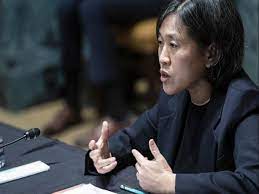WASHINGTON, May 13: Defending the Biden administration’s decision to support a temporary waiver of certain provisions from TRIPS agreement to deal with COVID-19, as proposed by India and South Africa, a top American trade official said people in India are facing an “existential crisis” due to the pandemic.
“With respect to the COVID-19 pandemic all you need to do is open the newspaper or turn on the TV and see the scenes in India and appreciate the reality that we are not through this pandemic, and that even for those countries that think they are in a good spot that things can really turn on a dime if you’re not careful,” US Trade Representative Katherine Tai told members of the Senate Finance Committee during a hearing on COVID-19 on Wednesday.
“So, with respect to COVID-19, I would say for the people of India, for all of the people who live in countries where there is less than two per cent access to vaccines as of today, that that is an existential crisis today,” she said.
The US Trade Representative was responding to questions from senators who were sceptical of the decision of the Biden administration to support the move of India and South Africa at the World Trade Organization.
During the Congressional hearing, Senator John Barrasso said he disagreed with the decision of the US President.
“The president has called for waiving intellectual property rights for vaccines. He’s called for that because we have a global health crisis. Well, I disagree with that decision by the president. Very clear on that. At the same time, he has made it very clear that this administration believes that we are facing a world climate crisis,” he said.
“As a matter of fact, on April 22nd, the president called on countries to step up, take further action on climate change in order to ‘overcome’ what he described as the existential crisis of our time. He didn’t say that coronavirus was the existential crisis of our time. He said that climate change was the existential crisis of our time. But we’re willing, the President is willing to waive intellectual property rights on something that’s less than the existential crisis of our time,” the senator said.
Senator Mark Warner, Chairman of the Senate Select Committee on Intelligence, however, strongly defended the administration’s decision. Warner is also co-chair of the Senate India Caucus.
“As co-chair of the US-India Caucus, I think the humanitarian crisis in India requires extraordinary actions. I also think there’s no more significant long-term geopolitical partner in Asia than building strong ties with India,” Warner asserted.
“I think taking a once-in-a-century action with a once-in-a-century pandemic is not an indication of some retreat of protecting intellectual property rights in this country,” he added.
Senator Elizabeth Warren also backed Tai on this issue. “Testing, treatment, PPE are critical, and that is why India and South Africa asked seven months ago for the world’s help to make those items without running a risk that a drug company was going to sue them,” she said.
“So I believe that the US should be backing these countries on this point, too, and not try to wiggle out of helping. Time is also of the essence here. Millions of people are dying, millions more will die, if it takes another seven months to reach any kind of meaningful agreement,” Warren asserted.
The special protections for drug companies are an even bigger issue than COVID-19 alone, she said. For years, the US government has let giant corporations write the rules of our international trade system, she noted.
“We’re fighting over a waiver to rules that never should have existed in the first place,” Warren said.
Responding to another question, Tai said USTR was committed to a full, good-faith effort at the WTO.
“The focus really is on promoting vaccine equity, and we will have to address the concerns of all parties involved, and those whose partnership we require in order to come to a kind of resolution at the WTO,” she said. (PTI)
Trending Now
E-Paper


